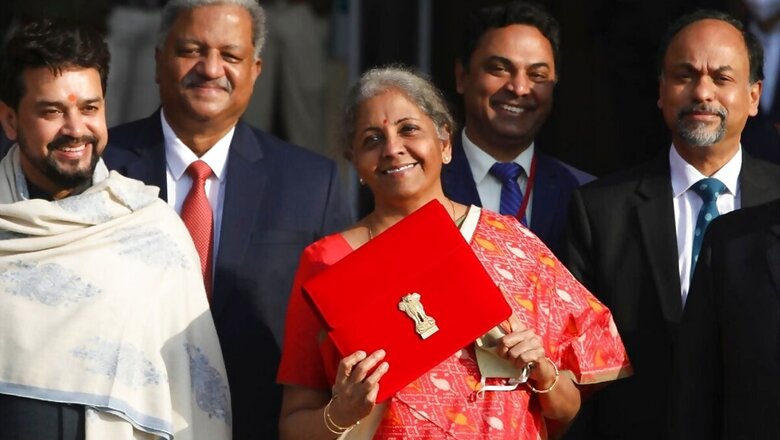
views
The best thing about Budget 2021-22 is that our worst fears didn’t come true—no Covid cess, no wealth tax, no quantum jump in expenditure. To be sure, many didn’t fear, indeed they rather hoped for, increased government spending. But Finance Minister Nirmala Sitharaman refused to embark on the path of fiscal irresponsibility.
“The fiscal deficit in RE [revised estimates] 2020-21 is pegged at 9.5 per cent of GDP,” she said in her Budget speech. “We have funded this through government borrowings, multilateral borrowings, Small Saving Funds and short-term borrowings. We would need another Rs 80,000 crore for which we would be approaching the markets in these two months.”
Expenditure in 2021-22 would be an estimated Rs 34.83 lakh crore, including Rs 5.54 lakh crore as capital expenditure (capex), which is an increase of 34.5 per cent in capex over the budgetary estimate of 2020-21. The fiscal deficit in 2021-22 is estimated at 6.8 per cent of the gross domestic product or GDP.
Such has been the impact of the coronavirus and the nationwide lockdown it induced that the Fiscal Responsibility and Budget Management Act (FRBM Act) targets have gone haywire. The FRBM Act stipulated a fiscal deficit of 3 per cent by the end of this fiscal. The Finance Minister said, “The effect of this year’s unforeseen and unprecedented circumstances has necessitated the submission of a deviation statement…”
ALSO READ| Budget 2021: Two PSU Banks, One Insurance Firm to be Privatised, Here’s What You Need to Know
Another positive aspect is that the off-Budget spending, which has been criticized as financial jugglery, has been done away with. This has also contributed to the higher fiscal deficit numbers.
The Narendra Modi government plans to keep the fiscal deficit level below 4.5 per cent by 2025-26 “with a fairly steady decline over the period,” the Finance Minister said. “We hope to achieve the consolidation by first, increasing the buoyancy of tax revenue through improved compliance, and secondly, by increased receipts from monetisation of assets, including Public Sector Enterprises [PSEs or PSUs] and land.”
There seems to be something unrealistic about the proceeds from divestment this fiscal. The budgetary estimate for 2020-21 from divestment in PSUs was Rs 2.1 lakh crore, but the government raised an estimated Rs 13,000 crore-Rs 14,000 crore till January this year. Yet, it expects to collect Rs 1.75 lakh crore from divestment in 2021-22. The government is planning big on privatization or strategic divestment, with BPCL, Air India, Shipping Corporation of India, Container Corporation of India, IDBI Bank, BEML, Pawan Hans, Neelachal Ispat Nigam Limited, and other PSUs on the block in 2021-22.
Even bigger, in intent if not in quantum, is the decision to privatize two public sector banks (PSBs) and an insurance company, which have not been named.
Bank privatization, if it happens, will be big, for PSBs are weak, controlled as they are by politicians and bureaucrats. Since banking is still dominated by the public sector, it has become a drag on the economy, badly hurting recovery.
An initial public offering of Life Insurance Corporation OF India (LIC) in 2021-22 has also been announced. Further, a new policy for strategic divestment has been approved. Now, all PSUs except in four “strategic areas” can be privatized.
There is some confusion here, though. For Sitharaman included banking in the four strategic areas. She said in her Budget speech: “The strategic sectors classified are: i) atomic energy, space and defence; ii) transport and telecommunications; iii) power, petroleum, coal and other minerals; iv) banking, insurance and financial services.” Still, the desire to sell off PSBs is welcome.
Everything, however, is not bold about the Budget, for Rs 20,000 crore has been allocated to “further consolidate the financial capacity of PSBs” in 2021-22. It is a well-known fact that bank recapitalization, despite having cost the exchequer lakhs of crores of rupees, has done little to strengthen PSBs.
Defence expenditure has been pegged at Rs 4.78 lakh crore for FY21-22, including capital expenditure worth Rs 1.35 lakh crore. “It is nearly 19 per cent increase in defence capital expenditure. This is highest ever increase in capital outlay for defence in 15 yrs,” Defence Minister Rajnath Singh tweeted. Evidently, the government is investing monetarily, and not just politically, in national defence.
Augmented capital expenditure means more money in infrastructure projects. The Finance Minister has instituted a financial mechanism for these projects. “Infrastructure needs long-term debt financing. A professionally managed Development Financial Institution is necessary to act as a provider, enabler and catalyst for infrastructure financing. Accordingly, I shall introduce a Bill to set up a DFI. I have provided a sum of Rs 20,000 crore to capitalise this institution. The ambition is to have a lending portfolio of at least Rs 5 lakh crore for this DFI in three years time.”
To boost manufacturing, the government has earmarked Rs 1.97 lakh crore, over the next five years, for the Production Linked Incentive or PLI scheme in 13 sectors.
ALSO READ| Union Budget 2021 Highlights: Income Tax Relief for Senior Citizens, 2 Public Sector Banks to Be Divested
For income tax payers, there haven’t been much changes; and the ones that have been made are for the better. Senior citizens over 75 years of age with only pension and interest income have been exempted from filing tax returns. Further, the time limit for re-opening cases has been reduced to three years from six years. However, serious tax evasion cases, with evidence of concealment of income of Rs 50 lakh or more in a year, can be re-opened up to 10 years, but with approval of the Principal Chief Commissioner.
A National Faceless Income Tax Appellate Tribunal Centre will be established, although its functioning has been questioned.
Sitharaman also announced a voluntary vehicle scrapping policy to phase out old and unfit vehicles. “This will help in encouraging fuel-efficient, environment-friendly vehicles, thereby reducing vehicular pollution and oil import bill. Vehicles would undergo fitness tests in automated fitness centres after 20 years in case of personal vehicles, and after 15 years in case of commercial vehicles.”
The finance minister provided Rs 35,000 crore for Covid-19 vaccines in 2021-22. She also augmented the Budget outlay for health and well-being to Rs 2,23,846 crore for 2021-22, against Rs 94,452 crore this fiscal, a rise of 137 per cent.
There are concerns about the inflows, for the borrowings for 2021-22 are in the region of Rs 12 lakh crore, which would be lower than the figure reported for this fiscal. So, where would the money for infrastructure, health, and defence come from? One hopes that the government would be able to address this issue.
P.S.: In her Budget speech, Finance Minister Nirmala Sitharaman said, “This Budget will be the first of this new decade.” This is incorrect as the new or third decade began in 2020, the second in 2010, and the first in 2000.
Read all the Latest News, Breaking News and Coronavirus News here




















Comments
0 comment